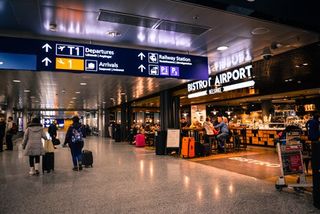
Health
Taking the Health Trouble out of Air Travel
Here's how to find a healthier way to travel.
Posted September 15, 2018

Up to one fifth of airline passengers become sick with colds or flus. Are there ways to decrease these infections?
Yes. A new Finnish study points out the problems and perils of airport security in a peculiarly microbiological way.
The Study
Researchers from The National Finnish Institute of Health and Welfare and the University of Nottingham decided to look at the “microbiome” environment of airport security. They checked and checked the different surfaces which any airline passenger might touch on their way to the gate. They found that the airport luggage trays, used to convey the privatest pieces of personal transport, had rhinovirus on about half of them. Rhinovirus is perhaps the most common cause of colds.
They found far less rhinovirus on every other surface. In keeping with many other studies, they found virtually none of it in the washrooms. Bathrooms are often the microbiologically cleanest part of a commercial building or residence.
Immunity and Infection
To get infected, you need an infective agent. Many people spend countless hours scouring surfaces to rid all that they touch of bacteria and viruses.
It is almost impossible to rid any environment of viruses and bacteria for long. Bacteria and viruses are omnipresent because they live on, in, and above you, not to mention flying through the air. The latter is a cause of many airplane based infections, as airplane interiors, effectively a dry desert climate of 6,000 feet, represents the Superbowl of viruses, with constant recirculation of all of your fellow passengers intimate partners into your private breathing space. You not only have markedly varying populations of viruses on your skin, hair, and eyes, but trillions of them inside your body, not to mention the 40 trillion bacteria in your gut.
The trick to staying well is to maintain an active, intelligent immune system. Your immune system has to constantly learn in order to keep you well. That is why getting sufficient rest, exercising periodically, doing all the healthy things we are supposed to do and often do not have the time or inclination to do, majorly impacts preventing colds and other infections.
It is also one of the main reasons why airports are such unhealthy environments, for much of it has to do with the stress of air travel.
Getting There
In order to reach an American airport, it is often impossible to use public transport. Much of the time there isn't any. Contrast this with many European airports, where predictable lines of transport through train and bus exist on a regular basis. The experience of getting to the airport and mvoing through security often represents a high level stressor which makes many of us more prone to infections. Fighting through traffic, trying to find a parking spot, getting one's bags checked, finding the way to the security lines, hoping to do this within a short period of time despite the unpredictability of transport and security delays, is a very common way to start any trip. Consideration of the viral load of security luggage trays may then appear very low on the list of concerns. It becomes understandable why so many of higher financial means attempt to skip the process altogether, increasing their ease of travel while simultaneously decreasing the ozone layer and providing climate change another tiny nudge up.
What You Can Do
In order to travel well and healthily, a personal interest in one's biological intelligence should come to the fore. Try to have a very good night sleep prior to any trip. People who sleep poorly often are much more prone to colds.
Next, get used to waiting. When it comes to air travel, patience is a necessity far more than a virtue. Try giving yourself enough time to prepare your luggage, get to the airport, get through security and customs in a manner that expects seemingly pointless delays. Carry with you your own forms of private entertainment, and if possible, include a good book. If Wi-Fi or Internet is not available, the printed word may more than suffice.
Once in the airport, use the washroom liberally. That includes cleansing your hands when you can, including a quick trip after going through security.
Once on board, having fought to get to your seat quickly in order to obtain rare overhead space, feel free to use the washroom on a regular basis once the pilot allows you. Not only can you clean your hands but you will decrease the risk of venous clots that cause far more cardiovascular events then people know. Though getting out of your seat may prove inconvenient for your fellow passengers, use it as an opportunity for polite engagement. I have treated more than a few people who met their future spouse sitting next to them on a flight.
Finally, when possible, rest on the plane. Many people, sleep-deprived road warriors of America's traveling businesses find that much of their sleep occurs in flight, often as a result of the time demands of transport and security prior to the trip. You can also rest your mind by reading or watching unfamiliar material you would otherwise never consider.
Flying is always an adventure; it is first and foremost a biological adventure. It can also become an adventure for you socially and intellectually, as you experience a wholly new living environment each time you’re in the air.
And don't forget to wash your hands.

